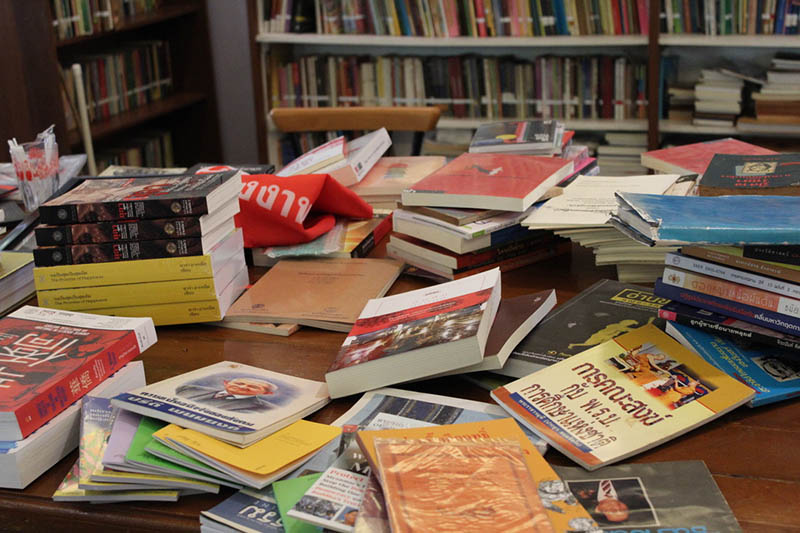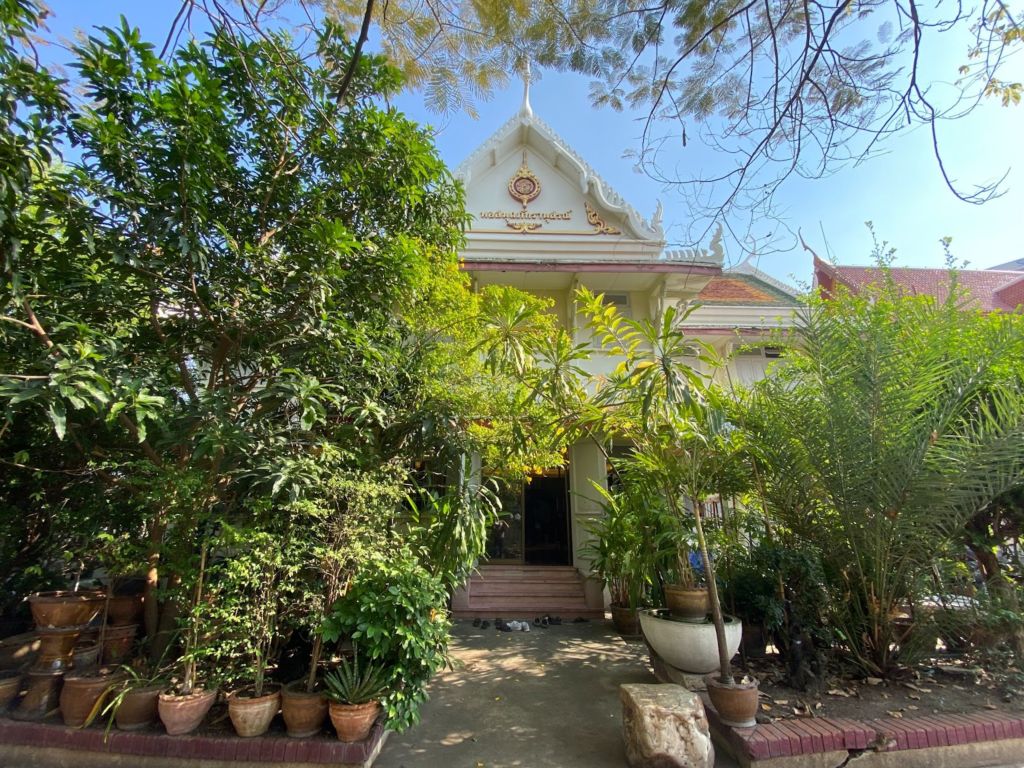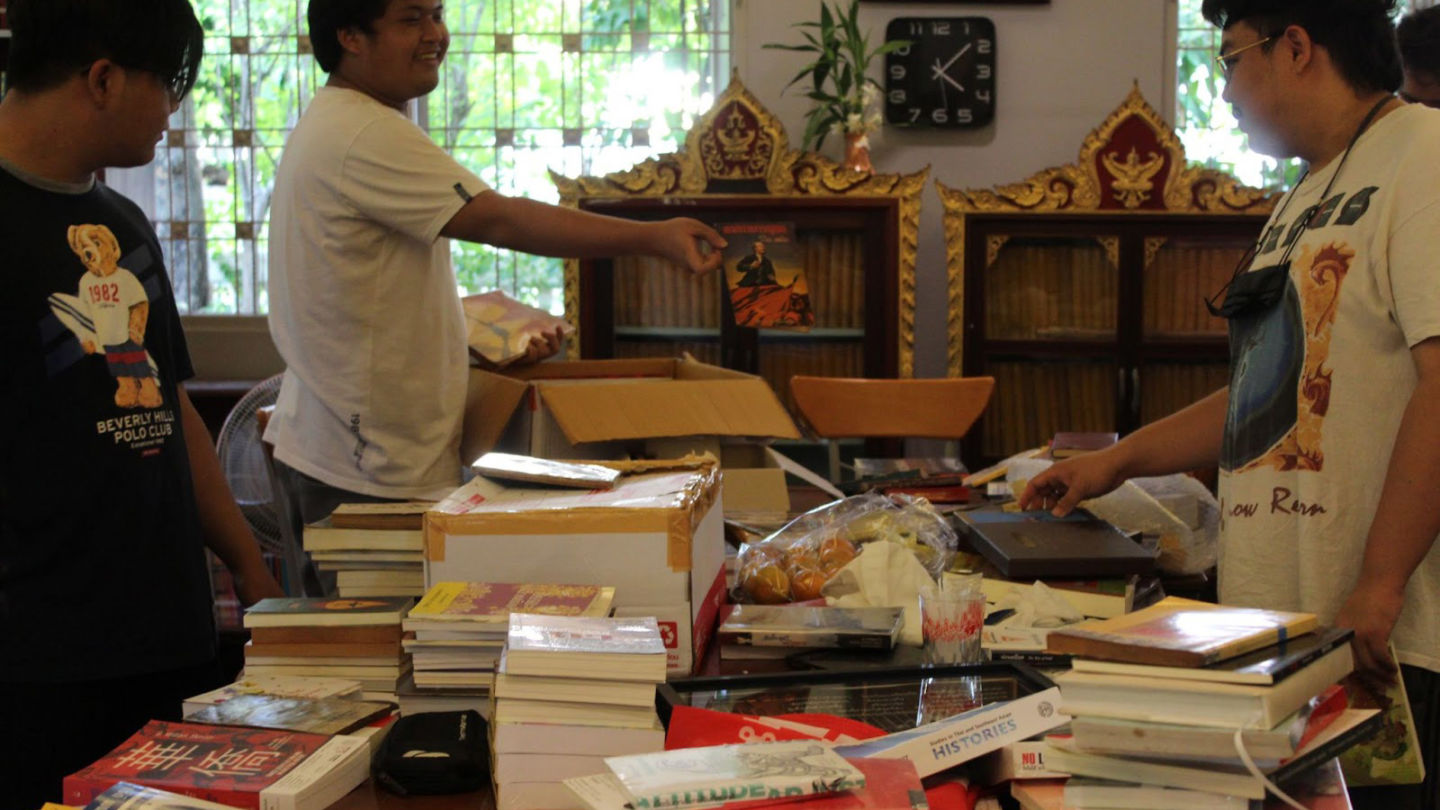Nestled in a leafy area of Wat Thong Nopphakun in an unnoticeable neighborhood near Bangkok’s Chao Phraya River, the 1932 People’s Space Library is tough to find – and maybe that’s a good thing.
One day after it opened late last month, five plainclothes police officers raided the place to search for evidence that it posed a threat to national security and eventually left with some stickers, a flag, and a children’s book.
The seized evidence? The flag was pro-socialism, the stickers had messages opposing the lese majeste law, and the picture book featured prominent youth protest leaders.
In response, the library’s founders took to social media, contacting every media outlet and journalist they knew. After one of them, Chanin “Ball” Wongsri, tweeted an urgent message at noon, word spread and the cops backpedaled, returning the items and insisting they hadn’t meant to take them.
“When the news about the police [raid] became viral, they told us, ‘Calm down guys, it’s just a misunderstanding;’ that they didn’t intend to take our book. They lied,” said Sahran Satchanon, a 21-year old cofounder and Thammasat University law student.

The officer, Sahran said, had brought along his young son, who looked about 7. The officer said he sometimes brought his son to protests, where it was his job to keep things calm. He proceeded to say that his son liked the protests and that’s why he took the book that day: for his son to look at.
Reached for comment today, Khongrit Sooksai of Khlong San police confirmed that officers went the day after the library opened to remove items that could threaten national security. But Khongrit said taking the library property didn’t amount to seizure.
“We didn’t confiscate anything as we’ve returned the items,” he said. “We were just looking to see if the items in questions were offensive.”
‘Dream Tales‘
The library’s 12 founders are all university students. They named it for the year that a group of military and civilian figures staged a bloodless revolution that ended absolute monarchy and enshrined civilian rule.
They collaborated on the library as part of their fight for academic freedom in the face of the draconian royal insult law, one of the tools use to stifle open debate and expression.
Sahran said the goal was to inspire people in a widening circle to replicate what they are doing throughout the country by establishing their own libraries.
“The weapon of thought is stronger than any weapon. If we can inspire others to do something like us, to resist against the government, resist against the state like us,” he said. “So our dream, academic freedom, freedom of expression, will be spread in all areas of the country.”

Inside the library, which opened Jan. 22, are books that have been banned at one time or another. Some are still banned today. Sahran told Coconuts they aim to provide the public with books not taught in the education system. He said that from kindergarten to university, the government curriculum mostly imparts propaganda about the royal family, enforcing its history as glorious providers who built the country, particularly from the Ayutthaya and Sukhothai periods of the 13th and 14th centuries.
“They teach us history, but only mainstream history they want us to know,” Sahran said. “So our idea came from this, that the library here will be differentiated from other libraries, because at other libraries there are only the mainstream historical books.”
The seized picture book, 10 Ratsadorn, is one of eight titles comprising Nitan Wad Wang, or “dream tales” created by pro-democracy luminaries such as Sombat Boonngamanong and actress-turned-activist Inthira Charoenpura. The books promote equality and democratic values using fun, child-friendly characters such as animals.
‘Extremely concerned’ Thailand to probe children’s books promoting democracy
In one, a duck fights for equality against a dragon. In October, reporter Wasant Techawongtham noted the potential power they hold in an op-ed titled “Kid’s books offer hope against Tyranny.”
In September, top education officials ordered the books, whose themes touch on co-existence in a pluralistic society and self-determination, be investigated as a potential threat.
Thailand has banned various books through history, most notably those critical of the monarchy, as well as books promoting or discussing Marxism during the Red Scare.

In 1957, Marxist poet, activist and thinker Jit Phumisak published The Real Face of Thai Feudalism Today, which analyzed class inequality. The book was shortly banned, and Jit was arrested later that year for holding communist views. Sahran said that sometimes, after an author dies they are sometimes reevaluated by society, and the bans lifted. Phumisak is a prominent example of this.
But censorship continues today, often indirectly. Academic Tyrell Haberkorn, a professor of Southeast Asian Studies at University of Wisconsin Madison, said the authorities use many methods to censor books.
“There are different ways of banning books. Official ways, such as when lists of banned books have been published in the Royal Gazette after 6 October 1976,” she said, referring to the black massacre of students on the campus of Thammasat University. “And unofficial ways, when Special Branch police or other state agents intimidate writers, publishers, or printers,” she said.
In 2017, book stores quietly pulled an Oxford researcher’s book on motorcycle taxis and the Red Shirt protests of 2010.
Several years before that, book stores dropped two books which examined the monarchy and royalists, Nai Nai and Dream the Impossible Dream. In 2014, police banned former Reuters journalist turned commentator Andrew M. Marshall’s A Kingdom in Crisis.

Sahran said the library’s founders are not radical Marxists, though some are socialists who support social welfare policies. Sahran said the reason the library has many books by Marxist authors is that such books are unavailable elsewhere in Thailand, and the founders believe all ideologies should be studied.
“We are studying all political compasses,” he said. “Marxists, fascists, liberalism; we are studying all.”
Though the library’s books and purpose are weighty and tense, the atmosphere was casual and comfortable on a recent visit. With Sahran were his friends and cofounders Chanin and Kittiwat Ungchareon, 20. The three are clearly close, joking and playfully sword fighting each other.
Also present was independent journalist Sa-nguan Khumrungroj, who for decades has documented Thailand’s struggle for self-determination and was himself arrested in 2018 over his reporting.
Sa-nguan was eager to introduce the library to visitors and show off the scattered collection of books strewn across its long table, still waiting to be shelved. He also stressed the library’s intention to engage with a wide range of views. He hopes activists, thinkers, and even politicians will visit one day.
“This is not just a library. This is activism. We want to have political debates with people from all sides, not just our side,” he said.
Although the only visitors so far had been journalists, since the library was only open a few days before closing for Chinese New Year, and many students have returned home, the founders hope they will soon find it a hub for thought and discussion.
The 1932 People’s Space Library is located on the grounds of Wat Thong Noppakhun, a short walk from MRT Khlong San. It’s open 10am to 5pm on Saturday and Sunday. Contact the library via Facebook, Instagram, or Twitter.


